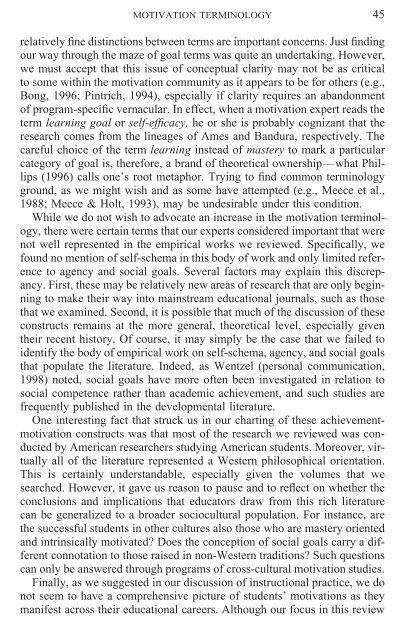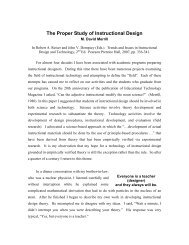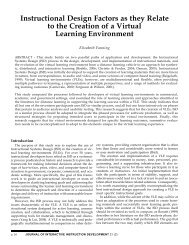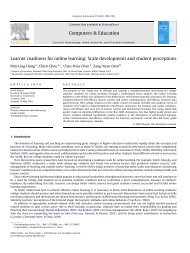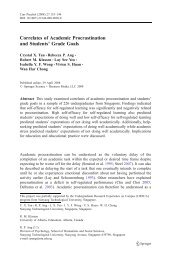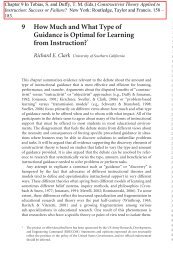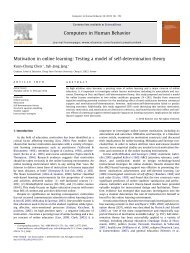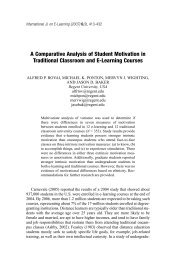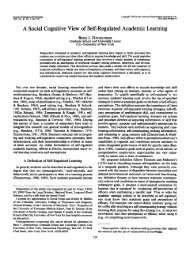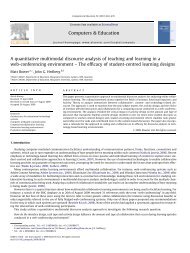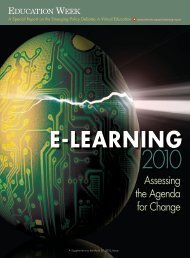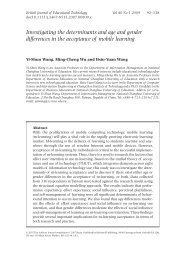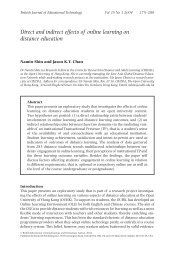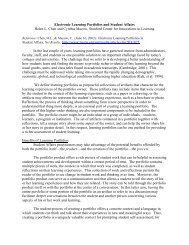A Motivated Exploration of Motivation Terminology - Anitacrawley.net
A Motivated Exploration of Motivation Terminology - Anitacrawley.net
A Motivated Exploration of Motivation Terminology - Anitacrawley.net
You also want an ePaper? Increase the reach of your titles
YUMPU automatically turns print PDFs into web optimized ePapers that Google loves.
MOTIVATION TERMINOLOGY 45relatively fine distinctions between terms are important concerns. Just findingour way through the maze <strong>of</strong> goal terms was quite an undertaking. However,we must accept that this issue <strong>of</strong> conceptual clarity may not be as criticalto some within the motivation community as it appears to be for others (e.g.,Bong, 1996; Pintrich, 1994), especially if clarity requires an abandonment<strong>of</strong> program-specific vernacular. In effect, when a motivation expert reads theterm learning goal or self-efficacy, he or she is probably cognizant that theresearch comes from the lineages <strong>of</strong> Ames and Bandura, respectively. Thecareful choice <strong>of</strong> the term learning instead <strong>of</strong> mastery to mark a particularcategory <strong>of</strong> goal is, therefore, a brand <strong>of</strong> theoretical ownership—what Phillips(1996) calls one’s root metaphor. Trying to find common terminologyground, as we might wish and as some have attempted (e.g., Meece et al.,1988; Meece & Holt, 1993), may be undesirable under this condition.While we do not wish to advocate an increase in the motivation terminology,there were certain terms that our experts considered important that werenot well represented in the empirical works we reviewed. Specifically, wefound no mention <strong>of</strong> self-schema in this body <strong>of</strong> work and only limited referenceto agency and social goals. Several factors may explain this discrepancy.First, these may be relatively new areas <strong>of</strong> research that are only beginningto make their way into mainstream educational journals, such as thosethat we examined. Second, it is possible that much <strong>of</strong> the discussion <strong>of</strong> theseconstructs remains at the more general, theoretical level, especially giventheir recent history. Of course, it may simply be the case that we failed toidentify the body <strong>of</strong> empirical work on self-schema, agency, and social goalsthat populate the literature. Indeed, as Wentzel (personal communication,1998) noted, social goals have more <strong>of</strong>ten been investigated in relation tosocial competence rather than academic achievement, and such studies arefrequently published in the developmental literature.One interesting fact that struck us in our charting <strong>of</strong> these achievementmotivationconstructs was that most <strong>of</strong> the research we reviewed was conductedby American researchers studying American students. Moreover, virtuallyall <strong>of</strong> the literature represented a Western philosophical orientation.This is certainly understandable, especially given the volumes that wesearched. However, it gave us reason to pause and to reflect on whether theconclusions and implications that educators draw from this rich literaturecan be generalized to a broader sociocultural population. For instance, arethe successful students in other cultures also those who are mastery orientedand intrinsically motivated? Does the conception <strong>of</strong> social goals carry a differentconnotation to those raised in non-Western traditions? Such questionscan only be answered through programs <strong>of</strong> cross-cultural motivation studies.Finally, as we suggested in our discussion <strong>of</strong> instructional practice, we donot seem to have a comprehensive picture <strong>of</strong> students’ motivations as theymanifest across their educational careers. Although our focus in this review


